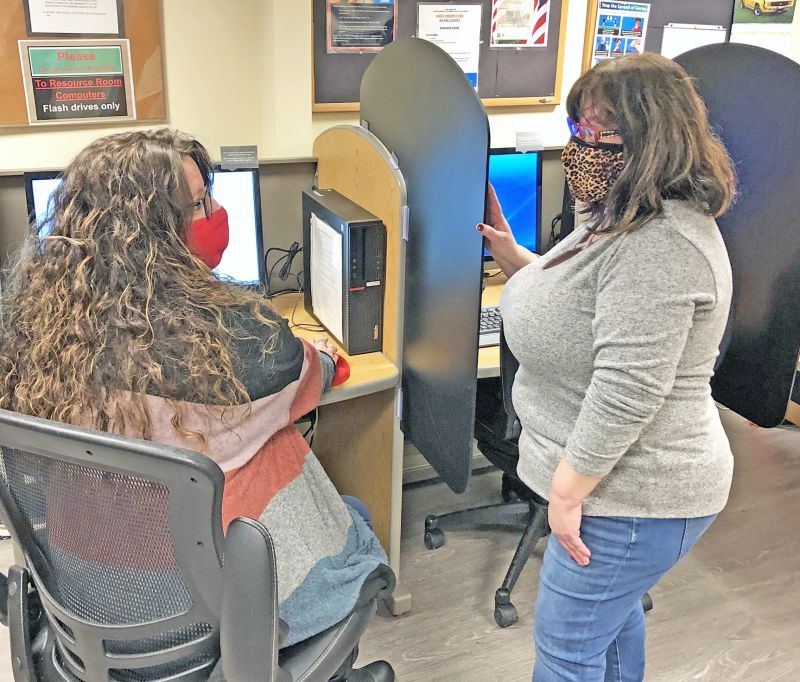Wayne County JFS keeps helping families impacted by pandemic
The Wayne County Department of Job and Family Services continues its effort to support families struggling due to the ongoing COVID-19 pandemic.
According to WCDJFS director Richard Owens, many of the programs offered through the agency maintain the relaxed restrictions that went into effect at the pandemic’s outset.
“We are at very low unemployment in Wayne County. Businesses continue to need qualified employees,” Owens said. “But there are people that need help, and our goal is to help those that need our services. Some people are really teetering on the edge.”
One popular service the agency oversees is the Prevention, Retention, Contingency Program, which provides short-term support for people dealing with unforeseen emergencies to maintain self-sufficiency. Embedded within the PRC Program is the COVID-19 Disaster Response Program, which further supports people directly impacted by the pandemic.
The primary differences between the traditional PRC Program and the COVID-19 Disaster Response PRC Program include the following:
Car repair
Traditional PRC Plan: 10% co-payment and $3,000 available in a 12-month period.
COVID-19 Disaster Response PRC Plan: waived co-payment and $3,500 available.
Rent/mortgage
Traditional PRC Plan: Eviction notice required, and rent can be no more than 50% of gross monthly income.
COVID-19 Disaster Response PRC Plan: No eviction notice required and 50% rule suspended.
Utilities
Traditional PRC Plan: Disconnect notice required and payment made two out of four months — not from a voucher or social service agency — immediately preceding the month of application.
COVID-19 Disaster Response PRC Plan: No disconnect notices required nor payment for two out of four months.
For both plans (traditional and COVID-19), households must be under 200% of the Federal Poverty Level and have a minor child in the home or be court-ordered to pay child support.
“Waivers are in effect for eligible individuals impacted by COVID-19,” social services administrator Stacey Tanner said. “If you had to take any time off work due to COVID-19 to care for someone, recuperate or your hours were reduced, you may be eligible.”
For more information regarding the PRC Program, call 330-287-5800 option 5 Monday through Friday from 8 a.m. to 4 p.m. or visit www.waynecountydjfs.com.
WCDJFS also is focused on matching job seekers with employment opportunities that match their skill set.
A total of 1,706 job openings were posted online at www.ohiomeansjobs.com from Nov. 14 through Dec. 13 for Wayne County. Compared to the same time period a year ago, this reflects an increase of 629 postings.
“We are a one-stop shop for those seeking employment,” OhioMeansJobs workforce administrator Crystal Brown said. “Through OhioMeansJobs, job seekers can explore careers, access the resource room, get resume help and interview tips. Tuition assistance for short-term training programs is also available.”
According to Brown, the agency also may help individuals with work clothing and transportation needs for those that secured new employment.
One of the agency’s most significant assets is the resource room, where job seekers receive personalized assistance with resume development, interview preparation and support with online job searches.
“People can feel safe when they access the resource room,” Brown said. “Shields have been installed, and the room is sanitized regularly.”
There is no charge for services provided through OhioMeansJobs-Wayne County.
To schedule an appointment for the resource room, call 330-264-5060 Monday through Friday from 7:30 a.m. to 4:30 p.m. View all of the OhioMeansJobs-Wayne County services online at www.everybodyworks.org/wayne. Stay updated on services and available jobs by following on Facebook, Linked-In, Instagram and Twitter.
Another useful program people have at their disposal is the Supplemental Nutrition Assistance Program. In 2019 SNAP helped more than 8,000 Wayne County residents with their food needs each month.
“There has been a temporary increase of 15% for the SNAP allotment that started Jan. 1,” income maintenance administrator Kelly Moorhead said. “And for several months, we have also been able to increase maximum benefit allotments.”
Moorhead expects the increases to continue during the public health emergency.
Due to the pandemic, the state also has temporarily made it easier for families with children in school by issuing Pandemic-EBT cards that provide eligible children with SNAP benefits.
Preschool through 12th-grade students within eligible school buildings who qualify for free or reduced-price meals through the National School Lunch Program or School Breakfast Program may be eligible for P-EBT benefits.
The program also has proven beneficial to families with children who are learning remotely.
“This program provides the meals that students would have had if they were attending classes in person,” Moorhead said. “That program has been extended through September.”
For those on Medicaid, Moorhead said the agency keeps cases open and closes them only by request, death or relocation out of the state.
“There is a significant number of people that are on Medicaid,” Moorhead said. “We aren’t going to further impact them during a pandemic by closing their case.”
Anyone who wants to explore Medicaid, SNAP or cash-assistance eligibility may call 1-844-640-OHIO Monday through Friday from 8 a.m. to 4 p.m., and according to Moorhead, an eligibility determination is completed 60% of the time on the initial phone call.
Dan Starcher is a public communications specialist for the Wayne County government.

